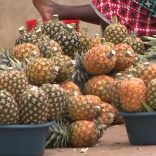Mozambique: Rat plague destroying corn crops in Caia
Cashew industry intends to double revenues to US$500 million a year by 2030 | Mozambique

Photo: CTA
The cashew nut is one of Mozambique’s most important crops, and an agribusiness sub sector which constitutes a potential source of foreign exchange generation, further magnifying its role in the national economy.
Involving around 1.4 million families, the cashew sub sector generates an annual turnover estimated at US$220 million, and, by 2030, it aims to reach US$500 million. To this end, businesspeople linked to the area say there is a need to “potentiate culture”.
Speaking during the panel on “Revitalization of the Competitiveness of the Cashew Sector in Mozambique” at the XVII Annual Conference of the Private Sector (CASP), Ilídio Bande, Director of the National Cashew Institute of Mozambique, said that, “during the last few years, some results have already been achieved”.
For example, in 2015, in the area of marketing, the numbers were in the order of 100,000 tons, and that an annual production of 150,000 tons had already been reached.
“In terms of exports, previously, we were in the order of US$81 million, now we are above US$100 million a year. The production of seedlings was at two million seedlings, but now we are at eight million seedlings, especially with the entry of the private sector into the business. In terms of treatment, we are treating eight million now, up from the previous five million. In terms of processing plants, we observe that some have closed, as a result of recent events,” he advanced.
Bande further pointed out that, despite the gains, major challenges still persist for the subsector, starting with plantings, where some existing cashew trees are “old”, and worn out.
“We have the problem of logistics, in addition to the problems of access roads. The marketing system needs to be improved, and more organised so that the business can flow. The issue of financing is also a necessary one, that is, agricultural financing is still a big challenge, and much more so in the cashew nuts subsector,” Bande revealed.
In order to reverse the scenario, Bande said, “we are reviewing Law 13/99, which is outdated – we have some innovations. In the areas of development, we also have some innovations. We are also setting the surcharges that we want introduced”.
Bande said that some penalties that were not included in the previous law are being defined, while research is being carried area to identify more productive areas and develop biofertilizers.
“In terms of production, we are introducing new cashew orchards, and we want to open a cashew tree spraying business with the private sector, to provide coverage. We also need to improve the issue of certification and financing so that they cover the cashew sector,” he concluded.













Leave a Reply
Be the First to Comment!
You must be logged in to post a comment.
You must be logged in to post a comment.